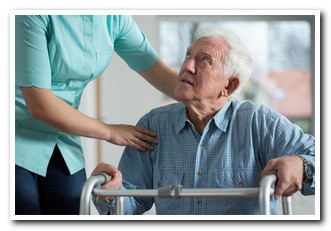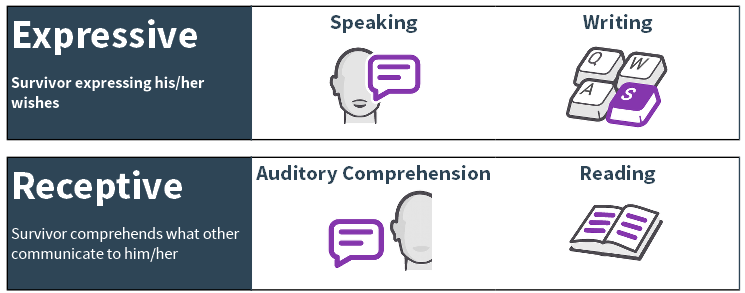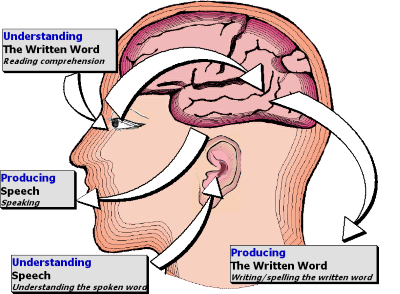Speech & Language in plain-English
Understand language so you can help your survivor
Imagine
waking up one day
 with the worst headache you’ve ever
had, in a strange room with a needle stuck in your arm. You’re scared and
in pain. To make matters worse, the people around you are speaking some
foreign language and they can’t understand you. So you don’t even
understand why you’re here, what has happened to your or what is going to
happen next. Oh, and you desperately need to visit the bathroom.
with the worst headache you’ve ever
had, in a strange room with a needle stuck in your arm. You’re scared and
in pain. To make matters worse, the people around you are speaking some
foreign language and they can’t understand you. So you don’t even
understand why you’re here, what has happened to your or what is going to
happen next. Oh, and you desperately need to visit the bathroom.
Then you remember your stroke (or how you got your brain injury).
That gives you a brief taste of what it’s like have a stroke or Traumatic Brain Injury (TBI). If you’re a caregiver it helps immensely to empathize with the survivor. It provides important insights into what will frustrate them, and motivate them. In addition to empathy, you’ll also need a better understanding of what language skills are impaired and which are still largely intact, so that you’ll know what skills to work on and what skills can be used to compensate for the impaired ones. E.g., if they can’t speak but they can still read, they can point to what they want on the menu at a restaurant or on a communication board you can make for them (I'll cover that in a future article). Also, when we provide exercises for the patient to work on, we need to know what sorts of instructions they can understand. If they can’t speak or understand what is said them, then asking them to point to picture is not going to be a good practice exercise.
Why we take speech & language for granted
 Language
can be like a car. It's a tool we use without understanding it.
Language is all in our head, where we can’t see it. It just works. Until
it doesn’t. That’s when we realize how complicated
language is. It’s like driving a car without needing to know how the
transmission works. Until it stops working. Then it’s
helpful to have a rough idea of how it works.
Maybe 2nd Gear doesn't work. But if you understand what
the gears are, you know you can shift from 1st to 3rd.
So, you use working gears to work around the damaged
gears.
Language
can be like a car. It's a tool we use without understanding it.
Language is all in our head, where we can’t see it. It just works. Until
it doesn’t. That’s when we realize how complicated
language is. It’s like driving a car without needing to know how the
transmission works. Until it stops working. Then it’s
helpful to have a rough idea of how it works.
Maybe 2nd Gear doesn't work. But if you understand what
the gears are, you know you can shift from 1st to 3rd.
So, you use working gears to work around the damaged
gears.
When the brain is damaged, perhaps due to to stroke, we suddenly have to start thinking about things that “just worked” in order to help someone recover those skills. You need to know what those language skills are, and which are impaired, so that you know what skills to work on. This is not meant to replace a proper assessment from a speech & language pathologist (SLP), just to help caregivers appreciate and understand what language is impaired. If you have a written assessment from an SLP (or speech therapist) please review that. If you do not have one, I highly recommend having a therapist do a proper assessment of the patient’s skills and needs. You can ask your doctor for a referral to a speech therapist. If you can not afford a speech therapist, I’ll be covering (in a future article) where to find affordable (paying what you are able) treatment from the most enthusiastic speech therapists.
Use the unimpaired language skills to make life easier
Most caregivers tell me that the patient has some areas still unaffected. And you can use those skills to compensate for the impaired one(s) and provide hints and cues during the treatment of the impaired skills. e.g., if we know the survivor can read but has difficulty with written word retrieval then we can cue them with sentence-completion tasks, which are far easier to create, and more flexible, than picture naming tasks. Likewise, at a restaurant, they can point to the menu item they want. They can also point to words or pictures on a Communication Board. I'm working on an article on how to make your own Communication Board, or you can ask your speech therapist for one.
 I spoke with one caregiver over a decade ago who had to
physically bring her husband (who outweighed her signifcantly) to the bathroom of their
small mobile home every hour or so just in case he had “to go”. Eventually
he learned a few words using speech therapy software. But in the
meantime, she could have show him a few
pictures (bathroom, kitchen, empty page) and let him point to the one he
needed. Or, better yet, he could ring a bell to get her attention and then
point to the picture. Speech therapists often create custom communication
boards for this purpose. Or you can make one yourself (I’ll cover that in
a future article) But, you have to start by understanding what
communication is impaired.
I spoke with one caregiver over a decade ago who had to
physically bring her husband (who outweighed her signifcantly) to the bathroom of their
small mobile home every hour or so just in case he had “to go”. Eventually
he learned a few words using speech therapy software. But in the
meantime, she could have show him a few
pictures (bathroom, kitchen, empty page) and let him point to the one he
needed. Or, better yet, he could ring a bell to get her attention and then
point to the picture. Speech therapists often create custom communication
boards for this purpose. Or you can make one yourself (I’ll cover that in
a future article) But, you have to start by understanding what
communication is impaired.
Language skill-areas
- Expressive: Expressing our wishes to others by:
- speaking - Common diagnoses affecting this are Apraxia (usually Oral or Motor Apraxia)
- writing (or spelling)
Both of the above can be affected by Expressive Aphasia, which impairs the recall of words (in either speech or writing, often both)
- Receptive: Comprehending what others say or write
to us, so, it's what we:
- Hear
- Read
Both of these can be affected by Receptive Aphasia, which impairs the ability to comprehend what we read or hear.

 Most
people don't fully understand language because there's no need. It's
all inside your head where you can't see it. But having a rough framework
of the types of language can help you to better understand what the
survivor can and cannot do. It'll also help you understand the
diagnosis from their speech therapist. In the upcoming issues of
this newsletter, I'll be diving into each of the skill areas and
explaining (in plain-English) simple ways to grasp how severe their
impairments are.
Most
people don't fully understand language because there's no need. It's
all inside your head where you can't see it. But having a rough framework
of the types of language can help you to better understand what the
survivor can and cannot do. It'll also help you understand the
diagnosis from their speech therapist. In the upcoming issues of
this newsletter, I'll be diving into each of the skill areas and
explaining (in plain-English) simple ways to grasp how severe their
impairments are.
Coming up in your next issues....
You'll get free treatment exercises and and explanation of the levels of ability within each of these communication skills:
- Reading Comprehension
- Auditory Comprehension
- Writing
- Speaking
Every day is an opportunity for recovery. Don't miss a single day.
- Surprising neuroscience discovery that makes recovery possible at any age.
- Why embracing failure leads to faster recovery.
- Unlock your survivor's communication needs in 4 steps.
- How to improve speech & language at the kitchen table.
Clay Nichols
Co-founder of
MoreSpeech and
Bungalow Software
for unlimited speech therapy at home and in the clinic.
 For
3 decades, Clay has helped patients, caregivers and speech pathologists
with speech & language software. He is not a speech-language
pathologist.
For
3 decades, Clay has helped patients, caregivers and speech pathologists
with speech & language software. He is not a speech-language
pathologist.
© 2025 Bungalow Software